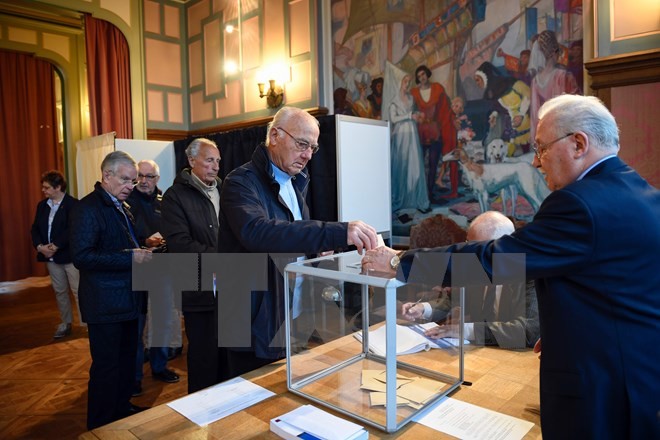(VOVWORLD) - The efforts of French parties, especially left-wing parties, in Sunday’s elections have helped France avoid the most worrying scenario: the far-right National Rally (RN) coming to power. But the election exposes deep divisions in French politics and risks creating a long-term deadlock.
 (Photo: VNA) (Photo: VNA) |
The official results of the second round of the parliamentary election, announced on Monday, showed that the coalition of four left-wing parties, the "New People's Front" (Nouveau Front Populaire - NFP), won the most seats (182) in the French Parliament in the next tenure. The centrist coalition "Together" (Ensemble - EN) of President Emmanuel Macron came second with 168 seats, and the far-right "National Rally" (RN) finished third with 143 seats.
Avoiding the worst scenario
With the RN (Rassemblement national) party finishing in third place, the most worrying scenario was avoided: the far-right RN party winning a majority and coming to power for the first time since World War II. Despite predictions of a larger win in the second round after the RN won a 33% vote share in the first round on June 30, the second round results were disappointing for the RN. This outcome showed the effectiveness of the "republican barrier," a two-round election mechanism designed to prevent extremist political forces from gaining power, as seen in previous presidential elections in 2002 (when Jacques Chirac ran against Jean-Marie Le Pen), in 2017, and in 2022 (when Emmanuel Macron competed with Marine Le Pen).
Efforts to block the RN after the first round had only one week, but were effective despite conflicts between parties on the left. While "The Republicans" (Les Républicains) chose not to participate, the left-wing NFP and centrist EN, despite their differences, worked to prevent the RN's success.
Prime Minister Gabriel Attal even worked to block extreme left candidates of the NFP. With 218 candidates from NFP and EN withdrawing in the second round, the number of "triangulaire" situations, in which 3 candidates competed in the second round, decreased significantly from 306 to 90, allowing voters to support the RN's opponents. Jean-Luc Mélenchon, leader of "La France Insoumise" (LFI), a key party within the NFP, praised the highest voter turnout (67.5%) since 1997 as a rejection of the RN, saying it was the victory of the French people, who were well aware of the risks of a possible RN party rule.
"The massive mobilization of voters is undeniable, especially impressive as it coincides with the onset of the summer holidays. The French people have unequivocally rejected this dire option for France. Contrary to many commentators' predictions, the RN Party is far from achieving an absolute majority," said Melenchon.
Prolonged deadlock
While the most worrying scenario of a far-right party coming to power was avoided, the election results have brought new concerns. The election confirmed the trend of polarization and division in French politics, as no single party or alliance won a clear majority (289 out of 577 seats). The National Assembly is now a "hung Parliament" with NFP, EN, and RN ruling out any alliance scenarios. The right-wing LR party won only 45 seats, insufficient to change the balance of power.
Observers calculate that France currently does not have any possible scenario for establishing a coalition government that can operate effectively. Armin Steinbach, a professor at HEC Paris Business School, thinks France may experience weeks or even months of deadlock before opposition parties accept compromises and coalitions, which are uncommon in French politics. Marine Le Pen, the leader of the RN, said:
She said: "France will be totally deadlocked with three groups roughly equal in size in the Parliament. So that’s the way it will go. It’s unfortunate. We will lose another year of illegal migration, lost purchasing power, and insecurity in our country. But if that is what it takes, well, then, that is what it takes."
The next major issue for France is the decline in President Emmanuel Macron's power. Macron's sudden decision to dissolve the Parliament on June 9, without consulting political allies, shattered the majority coalition supporting him since 2017. This dissolution caused the centrist EN faction to lose 82 seats after winning 250 seats in 2022 and 305 seats in 2017 when Macron first came to power.
During the campaign, parties like Horizons, led by former Prime Minister Édouard Philippe, and the Democratic Movement (MoDem), led by former Justice Minister François Bayrou, distanced themselves from Macron. Even Prime Minister Gabriel Attal said he will pursue his own political initiatives soon. All these factors will weaken Macron's power and ability to act over the next three years, at a time when France faces tough challenges both domestically and internationally.